Blue surge or red surprise?
A number of competitive seats statewide could set the tone nationally.
U.S. Senate

The race at the top of the ticket in Florida this year is also one of the most important elections in the country. U.S. Sen. Bill Nelson, the last remaining Democrat holding statewide office in Florida, faces the toughest challenge of his political career from Republican Gov. Rick Scott. The race highlights the challenge that Democrats face nationally; they need to pick up two seats to win a majority in the U.S. Senate, but they also need to defend incumbent seats like Nelson’s in Florida, which went for Trump in 2016.
Nelson is an institution in Florida, where he has held elected office almost continually since 1972, including as a state legislator, U.S. House member, state treasurer and insurance commissioner and, for the past 18 years, U.S. senator. He’s built a reputation as a non-controversial moderate who often seems to inspire more antipathy among liberal activists than conservative ones.
Scott has spent a fortune — much of it his own — building his brand in Florida, and he’s every bit as well known to voters as Nelson is. Scott has also been preparing for this race for several years, taking steps to soften the hard-right image he initially campaigned on. He’s embraced more centrist policies such as raises for public school teachers, in-state university tuition for the children of undocumented immigrants and, after the Parkland school shootings, raising the legal age to purchase firearms to 21.
If Scott succeeds in ousting Nelson, the odds are very good that the Republican Party will retain control of the U.S. Senate.
Governor

There’s no sharper contrast on the ballot this year than the race for governor, where the Republican, U.S. Rep. Ron De- Santis, is a hard-line conservative and Donald Trump devotee, and the Democrat, Tallahassee Mayor Andrew Gillum, is an aggressive liberal and a favorite of the Bernie Sanders crowd. Trump’s endorsement singlehandedly propelled DeSantis to victory in the GOP primary over Agriculture Commissioner Adam Putnam, while Gillum, unlike many moderate Democrats who tiptoe around the subject, advocates for impeaching the president. But the election will have profound policy implications for Florida. DeSantis, a member of the House freedom caucus, can be expected to govern even more conservatively than outgoing Gov. Rick Scott, with promises to continue deregulating education and health care and imposing stricter immigration controls like E-Verify. Gillum, meanwhile, supports Medicare for all, wants to raise corporate income taxes and lift starting teacher salaries to $50,000 a year. With a state Senate that is becoming more evenly split, a hard-charging partisan governor will have a real opportunity to tilt the direction of the state. And there are some big decisions looming for the next governor that are beyond the Legislature’s control, including potentially appointing three new Florida Supreme Court justices and deciding whether to sign or veto new congressional district maps that will have to be drawn following the 2020 Census.
The Cabinet

After the governor, the attorney general is the most important state-level office in Florida, with broad powers to protect consumers and regulate industry and to throw the weight of Florida into important legal battles affecting everything from health care to LGBTQ rights. Republican Ashley Moody, a former circuit judge and federal prosecutor from Tampa, emphasizes criminal justice priorities, with pledges to support police, enforce immigration laws and target gangs. Democrat Sean Shaw, a Tampa attorney who represents policyholders against insurance companies and a state representative, pledges to strengthen the office’s role as a consumer watchdog in investigating and litigating complaints against businesses accused of unscrupulous practices.

Both candidates, Republican Matt Caldwell and Democrat Nikki Fried, break the traditional, 10-gallon-hat-toting mold of a candidate for an office whose responsibilities extend far beyond farming concerns to everything from issuing concealed weapon permits to regulating auto mechanics, travel agents and telemarketers. Caldwell, a real estate appraiser from Lehigh Acres, has served in the state House since 2010, where he has played a leading role in major water-policy debates in recent years. Fried, a Fort Lauderdale attorney and lobbyist, says she would use the office’s powers to expand access to medical marijuana and advocate for farming of industrial hemp. Caldwell, who says government intrusion is the No. 1 obstacle to small-business success, would pull back on the office’s regulatory work. Fried says she would make the office a more active enforcer of consumer protections.

The sleepiest of Florida’s statewide races pits quasi-incumbent Republican Jimmy Patronis, who was appointed to the post in 2017 by Gov. Rick Scott and now faces his first election, against Democrat Jeremy Ring. Patronis, a restaurateur from Panama City, spent eight years as a rank-and-file representative in the state House but has since risen to prominence on the strength of his position as an innercircle ally of Scott, who appointed him to the Public Service Commission and the Constitution Revision Commission before handing him a Cabinet seat. In his brief tenure as CFO, an office whose duties also include serving as Florida’s fire marshal, Patronis has advocated for expanded workers’ comp benefits for first responders and streamlining regulations for insurance claims adjusters. Ring, a former Yahoo executive, is a moderate Democrat who has generally been popular with the state’s Republican-leaning business community. A former state senator, Ring is best known for championing state funding and policies that support startups and entrepreneurs and that encourage commercialization of university research.
U.S. Congress
The Big Picture -- Nationally, Democrats need to pick up 24 seats to reclaim a majority in the 435-seat chamber. Five of Florida’s 27 congressional districts — Republicans now hold 16 — are in play this year. There’s a good chance Democrats will gain at least one.
Hot Spots
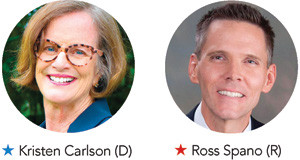
District 15: Republican incumbent Rep. Dennis Ross is retiring. Democratic attorney Kristen Carlson faces Republican state Rep. Ross Spano in the Lakeland-anchored district.
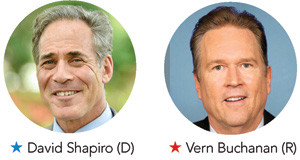
District 16: The district, which includes Sarasota and Bradenton, is currently held by Republican Rep. Vern Buchanan. Democrats think they have a strong challenger in personal injury attorney David Shapiro.
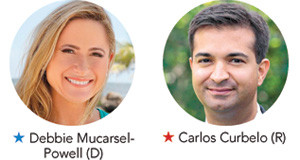
District 26: Republican candidates like U.S. Rep. Carlos Curbelo represent the best chance his party has of staving off a blue wave that could give Democrats control of the U.S. House. Curbelo’s district 26, which extends from Miami to Key West, voted for Hillary Clinton over Donald Trump by 16 percentage points in 2016. Yet Curbelo, a former Miami-Dade County school board member, has proven remarkably resilient, governing and campaigning about as far to the left as a Republican can. That has made things especially hard for Democratic challenger Debbie Mucarsel-Powell in what is likely the most competitive congressional race in Florida.
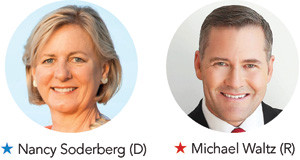
Districts 6: The Northeast Florida district, which GOP Rep. Ron DeSantis gave up to run for governor, pits Democrat Nancy Soderberg against Republican Michael Waltz.
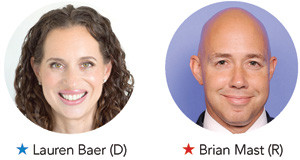
District 18: The district, along the Treasure Coast, is held by first-term GOP Rep. Brian Mast. He’s being challenged by Democrat Lauren Baer, an attorney and member of the family behind Baer’s Furniture.
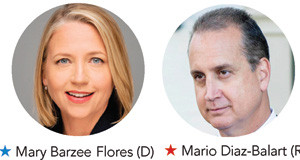
District 25: Republican Rep. Mario Diaz- Balart faces Democrat Mary Barzee Flores in district 25, which runs along Alligator Alley.
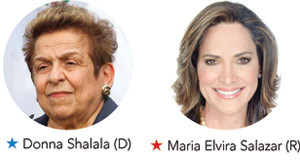
District 27: Democrat Donna Shalala, the former University of Miami president and Secretary of Health and Human Services under President Bill Clinton, is favored to win district 27 in Miami, which has opened with the retirement of longtime GOP incumbent Rep. Ileana Ros-Lehtinen. But she faces a strong Republican opponent in Maria Elvira Salazar, a former local TV news anchor.
Florida Senate
The Big Picture — The most important races in Florida this year just might be those for the state Senate, which includes 23 Republicans, 16 Democrats and one vacant seat previously held by a Republican. It’s unlikely, but not impossible, that long-suffering Florida Democrats could emerge with a narrow majority or a split in Tallahassee’s upper chamber. But to win control of the Senate, Democrats almost certainly will have to run the table and win all five races seen as genuinely competitive.
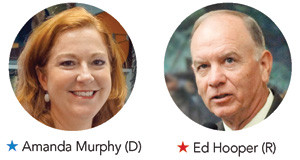
District 16: In the Tampa Bay region, two former state House members, Republican Ed Hooper and Democrat Amanda Murphy, are vying for the Pinellas County seat in district 16 previously held by former Republican Sen. Jack Latvala.
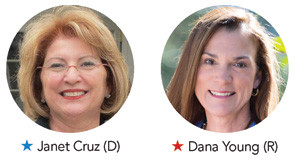
District 18: The most expensive legislative race in the state is in Tampa, where incumbent Republican Dana Young is trying to fend off outgoing House Democratic Leader Janet Cruz.
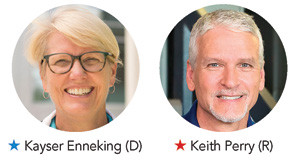
District 8: A big battleground is in district 8 in North-Central Florida, where GOP-leaning suburbs, exurbs and rural communities surround Democratic-heavy Gainesville. Sen. Keith Perry, the Republican incumbent who won a tough race two years ago to win the seat, faces Kayser Enneking, a Gainesville physician.
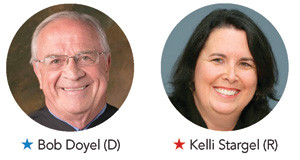
District 22: Democrats have mounted a surprisingly strong challenge in Polk and Lake counties, where Bob Doyel, a retired circuit court judge, is taking on incumbent Republican Sen. Kelli Stargel.
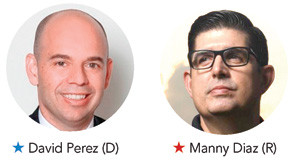
District 36: In Miami, outgoing Republican state Rep. Manny Diaz faces Democrat David Perez, an ex-aide to former Miami-Dade Mayor Alex Penelas.
Florida House
The Big Picture — Thanks in part to Republican gerrymandering and the tendency of Democratic voters to cluster in urban areas, the GOP will maintain control of the House no matter what happens on election day. Including a trio of open seats previously held by Republicans, the GOP holds 78 seats in the 120-member House. While the size of their majority could shrink, it’s in no danger of disappearing — there are, at most, two dozen competitive seats in the chamber — and, in reality, a far smaller subset of those is genuinely competitive this year.
Hot Spots
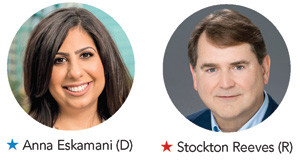
District 47: The downtown Orlando district, where Democratic activist Anna Eskamani, who insiders in both parties think is a potential star, faces Republican Stockton Reeves.
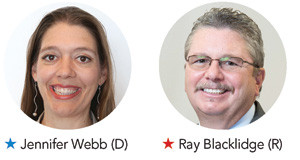
District 69: Republican Ray Blacklidge faces Democrat Jennifer Webb in the district, which includes St. Pete Beach.
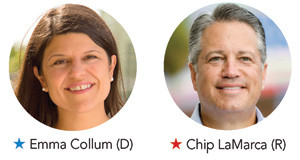
District 93: The coastal Fort Lauderdale district, where Emma Collum, an attorney and Democratic activist, faces Republican County Commissioner Chip LaMarca.
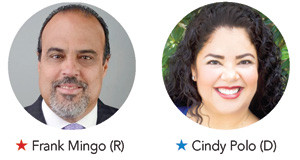
District 103: In this Miami district, Republican Frank Mingo faces Democrat Cindy Polo.
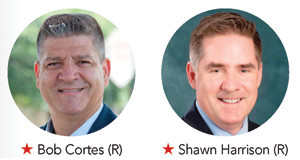
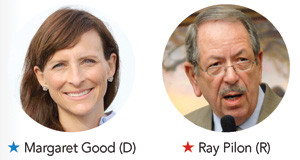
Others: Vulnerable incumbents this fall include Republican Reps. Bob Cortes, who represents a suburban Orlando district; Shawn Harrison, who holds a Tampa seat; and Democratic Rep. Margaret Good, who won a special election earlier this year in district 72 in Sarasota but now faces former Republican Rep. Ray Pilon, who used to hold the seat.
The Mayors
The races for U.S. Senate and governor command most of the money and attention, but there are important races further down the ballot all over Florida this fall.
Pensacola: In Pensacola, voters will choose just their second mayor since switching in 2010 to a strong mayor form of government. Grover Robinson, an Escambia County commissioner, and Brian Spencer, a Pensacola City Council member, are vying to succeed incumbent Ashton Hayward, who opted not to run for a third four-year term.
Orange County: In Central Florida, Jerry Demings, the Orange County sheriff, has already won election as county mayor, the most powerful local office in the region. Demings, the county’s first African- American mayor and the first Democrat to win the post in 20 years, avoided a runoff by trouncing two Republican opponents in the primary. But just who Demings will be working with on the county commission remains unsettled; voters will decide three of the seven board seats in November.
Tallahassee: There will be a new mayor in Florida’s capital, where the incumbent, Andrew Gillum, is now the Democratic nominee for governor. Competing to succeed Gillum are John Dailey, a Leon County commissioner, and Dustin Daniels, Gillum’s former chief of staff at City Hall.
Key West: Key West will elect its first new mayor in a decade, as term limits force out Craig Cates. Two former city commissioners are competing for the job in the nation’s southernmost city: Teri Johnston, who narrowly avoided winning outright in the primary, and Margaret Romero.
Miami: Strong Mayor?: One of the most consequential local elections is in the city of Miami, where, should it survive legal challenges, there will be a referendum on the ballot to switch the city to a strong mayor form of government. The referendum is being pushed by Miami’s current mayor, Francis Suarez, who would become the most powerful person in city government. Opponents, including Miami-Dade County Mayor Carlos Gimenez, have labeled the move a power grab.
Broward County School Board
Some of the most intense local elections in Florida this year have been for the Broward County School Board. Five of nine board seats were up for grabs, and the debate has been dominated by the February mass shooting at Marjory Stoneman Douglas High School — whether the district could have done more to prevent the tragedy and how it has responded since. Lori Alhadeff, whose 14-year-old daughter Alyssa was one of 17 people killed in the shooting, won an open seat outright in the primary. But Ryan Petty, whose 14-year-old daughter Alaina was also killed, and Richard Mendelson, a former Stoneman Douglas teacher, both lost to incumbent board members. One seat still remains to be decided in November, where incumbent Ann Murray faces Jim Silvernale, a union leader.
See other stories from Florida Trend's October issue.
Get Florida Trend's October magazine – print or digital. Select from these options:
* offer valid for new subscribers only
